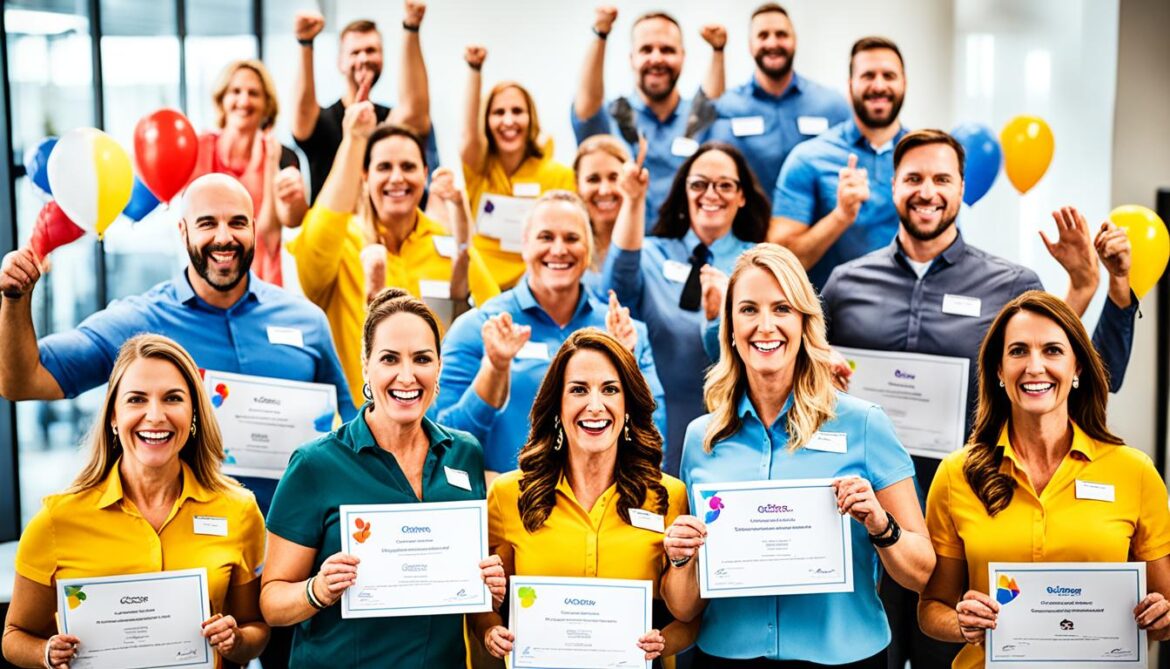Boosting Staff morale with Effective Employee Recognition is a game-changer for any organization. Did you know that employees are 2.2 times more likely to work harder when their efforts are recognized?
A research conducted by McKinsey highlights that effective talent management, which includes recognizing and rewarding employee efforts, significantly boosts organizational performance.
According to McKinsey, companies with effective talent management strategies, which include recognizing and rewarding employee efforts, see significantly better returns to shareholders compared to their competitors (McKinsey & Company).
Furthermore, Gallup’s research highlights that employees who feel acknowledged are more engaged, productive, and loyal (Scott Gould).
By consistently acknowledging your team members’ hard work, you not only foster a positive work environment but also encourage stellar work habits and retain your top talent.
Discover how you can implement an effective employee recognition program to unlock your team’s full potential.

The Importance of Employee Recognition
Showing thanks to employees is about praising their daily work, big achievements, and extra efforts. It’s also about celebrating their innovative ideas and saving the company money.
A simple ‘thank you’ from the boss can make employees 69% more likely to work harder. Also, 37% of employees said more recognition would make them work better more often.
By rewarding your employees, you can make them happier, more motivated, and more engaged. It shows them how much they mean to you and feel appreciated. This can help keep your best employees.
Employees who feel seen at work are more likely to think promotions are fair and to innovate. They also feel more willing to go the extra mile as team members.
Why Employee Recognition Matters
Employee recognition is key to good management. Today, it’s more crucial than ever as the fight for talent grows. It keeps top talent, boosts engagement, and pushes for better performance.
A workplace that values recognition and reward beyond just year-end events is uplifting.
Our 2023 study shows over 700,000 people agree. When everyone has a fair shot at recognition, like getting a gold star, they’re 2.2 times more likely to work harder. A simple ‘thank you’ from bosses can make employees 69% more likely to put in extra effort.
“Recognizing and rewarding your employees’ contributions not only boosts their performance and engagement but also helps retain your top talent and cultivate a positive work culture.”
Keeping employees(retention) can save money compared to hiring new ones. Recognizing employees helps reduce turnover. Those who feel unseen are more likely to leave, and unhappy employees are four times more likely to do so.
Formal and public recognition programs can make employees more engaged and committed. This leads to a more motivated and dedicated team. These programs also make employees happier and more likely to stay.
There are many types of recognition programs, like Employee of the Month or Team Recognition. Each focuses on different aspects of what employees do well. These programs make the workplace better by making employees more engaged and happy.
When employees feel valued, they stick around and work towards the company’s goals. A positive work environment from recognition programs helps with mental health and reduces stress and burnout.
Types of Employee Recognition
Employee recognition can be many things, like public praise or personalized rewards. Companies reward employees for their hard work, good behavior, and going the extra mile. These rewards boost motivation, engagement, and happiness at work.
Public praise from a manager or leader is powerful. It lifts the person’s spirits and shows the team what the company values. Private “thank you” meetings or messages also make a big difference.
They offer a personal touch and let employees talk about their work.
Peer-to-peer recognition helps build a culture of thanks. It lets employees praise each other, using their natural teamwork. Customer feedback is another great way to recognize people. It shows how their work helps others.
Companies can also give personalized rewards like gifts or extra time off. These rewards show how much an employee’s work is valued. They leave a positive mark on the employee.
The best employee recognition uses a mix of methods. It should fit the company and its workers. By recognizing employees in different ways, companies can build a culture of thanks. This helps teams work better together.

“Compliments can boost memory, learning, and motivation. Offering thoughtful praise and compliments can strengthen bonds with colleagues.”
Recognizing and Rewarding Employee Contributions
This statistic highlights the immense power of a well-structured recognition program. By consistently acknowledging your team’s hard work, you foster a positive work environment, encourage stellar work habits, and retain your top talent.
Effective recognition can take many forms, from simple verbal praise for a job well done to formal recognition awards that publicly celebrate achievements.
Employees who receive consistent and genuine forms of recognition feel a sense of appreciation and motivation, significantly boosting employee morale.
When employees receive such recognition, it not only makes them feel valued but also makes their efforts feel impactful. Additionally, offering development opportunities as part of a recognition program can further enhance their skills and commitment.
Ultimately, employees who receive regular acknowledgment are more likely to stay engaged and loyal to the organization, knowing their contributions are appreciated and their growth is supported.
Effective Recognition Strategies
Employers have many ways to recognize and reward employees. But, it’s important to make it personal. Giving a reward that fits what the employee likes makes it more special. This approach has a bigger impact and is worth more.
Some top ways to recognize employees include:
- Recognition by leadership: When bosses praise employees in front of others, it motivates them a lot. It makes them feel proud and accomplished.
- Private appreciation: Saying “thank you” privately or sending a message from a manager means a lot. It shows they care on a personal level.
- Peer-to-peer recognition: Letting employees praise each other builds strong work relationships. It also helps create a team spirit.
- Customer feedback: Hearing good things from customers shows an employee’s hard work and commitment. It’s a big boost.
- Personalized rewards: Giving gifts or rewards that match what an employee likes makes the recognition feel more thoughtful.
A recent study found that companies with good recognition programs do much better. Using different ways to recognize people creates a culture of thanks. It makes employees happier, more engaged, and more productive.
“Recognizing and rewarding employees’ work is a smart move for your company’s success. When done well, it greatly helps with keeping employees, making them work harder, and improving business results.”
Democratizing Recognition
In today’s fast-changing work world, a big change is happening – making employee recognition more equal. Before, recognition was often given from the top down, with bosses giving awards to their teams. Now, more and more, all employees are getting involved in saying thanks to each other. This creates a culture where everyone feels valued.
This way of recognizing each other has many good points. When coworkers praise each other’s work, everyone feels more important. This makes people happier at their jobs, more connected to the company, and more likely to work harder. It also helps spread good habits throughout the whole team.
Many new companies love this way of giving recognition. For example, Atlassian lets its workers give “Kudos” to each other, and they gave out over 50,000 last year. Alston & Bird LLP lets teams vote on who gets special thanks in their newsletter. Ally Financial’s “I am an Ally” award lets workers praise those who live by the company’s values.
These examples show how giving recognition to everyone can build a place where people appreciate and work together better. By letting all employees give recognition, companies can make a real, true, and welcoming way to say thanks. This makes everyone feel seen and heard.
“Employees who feel recognized at work are twice as likely to exceed their regular duties with enthusiasm and excitement.”
Moving to a more equal recognition system is not just about giving power to workers. It’s also about using the knowledge and ideas of everyone in the company. When everyone gets to say who deserves praise, we get a better idea of what’s really important. This helps everyone work together better towards the company’s goals.
As work changes, making recognition more equal is key to a better work life. By letting employees celebrate each other’s wins, companies can make their teams stronger and happier. This leads to a work place where everyone does their best.
Celebrating Small Wins
It’s easy to chase big achievements, but celebrating small wins is just as important for your team’s morale. These small successes can boost employee well-being, motivation, and creativity. They happen often and can make a big difference.
One great way to honor these overlooked achievements is with employee of the month programs. This method regularly highlights individual efforts. Sharing these wins in company newsletters or on social media can spread the joy even further.

Recognizing Unsung Heroes
Don’t overlook the unsung heroes who work behind the scenes. Leaders showing real, heartfelt thanks can create a strong culture of recognition. This encourages good behavior in your team.
- Vinove Software values the importance of recognizing and celebrating small wins in the workplace.
- The organization acknowledges team and individual contributions through various means such as team meetings, internal newsletters, and social networking sites.
- Vinove provides rewards and incentives for outstanding work, including cash bonuses, added vacation time, unique presents, and opportunities for professional growth.
By balancing immediate wins with long-term goals, you can make a workplace where employee contributions are always celebrated. This approach keeps everyone motivated and engaged.
“Progress in work significantly influences employees’ well-being, motivation, and creative output. Small wins during work can greatly enhance inner work life.”
Building a Recognition-Focused Culture
Starting a recognition program is just the beginning. Great companies keep improving how they reward employees. They think about how recognition fits into their company culture. A culture of recognition makes employees more engaged and loyal.
Employee appreciation should be a big part of your work culture. You can do this with specific and relevant recognition, timely feedback, and different ways to show appreciation.
For a recognition-focused culture, leadership support is key. Leaders should show the behaviors they want others to follow. They should often thank employees for their work, celebrate successes, and make recognition a top priority.
Good recognition programs are simple to understand and use. They should change based on what employees say. Having clear rules, ways to communicate, and ways to give feedback helps employees take part in recognition. This makes sure recognition is meaningful and has an impact.
Using personalized recognition strategies is important for a culture where employees feel valued. Some employees like being recognized in public, others prefer private praise, and some like rewards they can use. Offering different ways to recognize employees helps meet everyone’s needs and makes them feel special.

A recognition-focused culture boosts employee engagement and helps keep top talent. When employees feel truly recognized, they stay loyal and motivated. This leads to more productivity and success for the business.
“People may take a job for money but often leave for more recognition.”
By creating a recognition-focused culture, companies can help their employees reach their full potential. This leads to more employee appreciation and a better work environment. It supports growth and success over time.
Conclusion
It’s key to recognize and reward employee efforts to create a positive work environment. This helps keep top talent and motivates them to do more. By using good recognition strategies, making it open to everyone, and celebrating all achievements, companies can value their employees’ hard work.
Studies show that recognized employees are more engaged and productive. They also tend to stay with their jobs longer. Good employee recognition boosts morale and helps keep people around. It also matches the company’s goals, brand, and culture.
By setting clear standards for awards and linking them to specific achievements, companies can make recognition clear and fair. This makes sure all employees feel important.
Creating a workplace that focuses on recognizing employees is crucial for keeping and motivating the best people. By putting employee recognition first, companies build a strong community. They strengthen their values and make a place where everyone can succeed and feel valued.
FAQS
1. What is the importance of employee recognition programs in boosting staff motivation?
Employee recognition programs are vital for boosting staff morale as they acknowledge the efforts and contributions of team members, making employees feel valued and appreciated. This leads to increased employee engagement, and retention.
2. How can public recognition contribute to boosting employee morale?
Public recognition plays a crucial role in boosting employee spirit by providing employees with a sense of achievement and validation. When employees feel appreciated in front of their peers, it enhances their morale and motivates them to continue delivering good work.
3. What are some effective employee recognition program ideas to boost team hard work?
Implementing employee recognition program ideas such as peer recognition, regular recognition, and employee rewards can significantly boost team morale. These programs create a positive employee experience and foster a culture of employee appreciation.
4. How does recognition and reward impact employee morale and motivation?
When employees feel acknowledged and rewarded for their efforts, it reinforces positive company values and encourages them to continue performing at their best.
5. What role does peer-to-peer recognition play in boosting staff motivation?
Peer-to-peer recognition is crucial for boosting staff morale as it allows team members to appreciate and acknowledge each other’s contributions. This form of recognition fosters a supportive company culture and strengthens employee engagement.
6. How can informal recognition methods contribute to boosting employee performance?
Informal recognition methods such as simple gestures of appreciation or thank-you notes can have a significant impact on boosting employee motivation. These acts of appreciation make employees feel valued and respected in the workplace.



1 comment
[…] You may be interested in this blog post also Boosting Staff Morale with Effective Employee Recognition […]